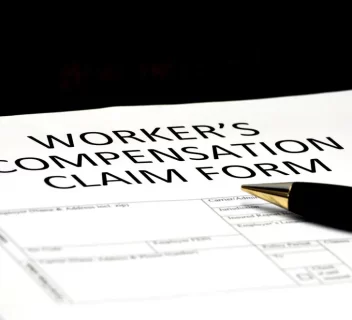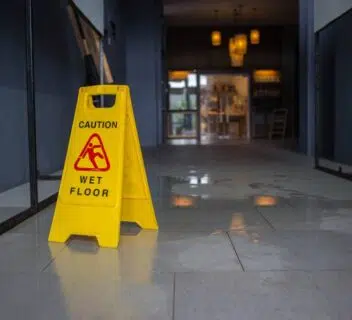If I Get Injured at Work, Can I Sue My Employer?
In this article, you’ll find answers to common questions about what to do when you are injured at work, or get hurt on the job, Workers’ Compensation, and what to know when considering “If I get injured at work, can I sue my employer?”
Additional Topics Covered:
- Examples of damages recoverable in lawsuits
- Who is exempt from workers compensation?
- Do I qualify for workers’ compensation benefits?
- What is the advantage of workers compensation?
- Knowing when to hire a workers comp lawyer
- Should I claim for an accident at work?
- What should an employee do if there Is a workplace accident?
- How can I find a workers compensation lawyer near me?
Workplace injuries are surprisingly common across America. According to the Bureau of Labor Statistics, there were 2.8 million injuries in private industries alone in 2022 and 5,190 fatal injuries in the year 2021.
If you’ve been injured in the workplace, then you could be left reeling with a variety of different losses. This can be overwhelming and difficult to recover from. Fortunately, the law does provide several paths to justice and recovery. Perhaps most important among the available options is that of workers’ compensation benefits.
Examples of Damages Recoverable in a Lawsuit
Examples of losses from work-related injuries are:
- Wage loss
- Medical expenses
- Disability issues
- And more
Which Situation Qualifies an Employee for Workers Compensation Coverage?
Workers’ compensation benefits are paid out to employees who are injured on the job, or who suffer injuries linked to their job duties. These benefits are critical for many employees, particularly those in riskier professions. Let’s take a closer look.
Do I Qualify for Workers’ Compensation Benefits?
Despite the name, workers’ compensation benefits are not available to all workers. Typically full-time, part-time, temporary, and seasonal employees, are covered by worker’s compensation. Some states even extend this coverage to student workers, interns, and apprentices.
For instance, certain job types like domestic workers, agricultural workers, and volunteers often fall outside the scope of workers’ compensation. To avoid any confusion, it’s always best to refer to your state’s specific regulations for the most accurate information.
Even if you’re considered an employee, simply having a work-related injury doesn’t automatically guarantee eligibility. The injury or illness must occur during your employment and directly result from your job duties. This includes a wide range of situations, such as:
- On-the-job accidents: Slips, falls, machinery malfunctions, and other sudden events.
- Repetitive stress injuries: Conditions caused by prolonged strain, like carpal tunnel syndrome from typing or back pain from lifting heavy objects.
- Occupational diseases: Exposure to chemicals, asbestos, loud noise, or other hazardous materials over time.
- It’s important to remember that being prompt is essential. In most cases, you need to report your injury to your employer quickly and adhere to state-specific filing deadlines to ensure your claim is valid. Additionally, the severity of your injury may impact your eligibility, with specific minimum disability requirements.
If you’re an independent contractor, dealing with work-related injuries can present unique challenges. Since you wouldn’t be covered by workers’ compensation, you may need to explore alternative avenues to ensure some level of protection.
Assuming you can prove that the employer was negligent, reckless, or engaged in intentional misconduct, then you can sue them and hold them liable for your injuries without workers comp. Also, these damages may even be greater than your would-be workers’ compensation benefits.
What Is the Advantage of Workers’ Compensation?
Well, for one thing, you get to avoid the hassle of a workplace injury lawsuit. But more importantly, workers’ compensation benefits are paid out even if your employer wasn’t at fault for your injuries.
If you have a slip-and-fall accident while working and hurt yourself, even if it wasn’t anyone else’s fault, you are still entitled to recover workers’ compensation benefits! That’s an enormous advantage for situations where you have suffered a loss, yet no one else is to blame.
Workers’ Compensation benefits are valuable, of course, but they are still limited in certain ways. For example, workers’ compensation benefits do not cover pain and suffering damages and other such losses. Instead, these benefits cover wage loss and medical expenses. You may be wondering, “Can I sue my employer for pain and suffering?”
Typically, if you get hurt at work, you can’t sue your employer, whether it’s for workers’ compensation benefits or afterward. It’s also challenging to sue the insurance company due to legal limitations.
To pursue such claims, like emotional stress, you would need to initiate a personal injury lawsuit and provide evidence that your employer was at fault.
Can You Sue If You Accept Workers’ Compensation?
If your employer offers workers’ compensation, you generally can’t sue them for a workplace injury, regardless of whether you choose to take those benefits or not. Employers tend to have workers’ comp insurance to protect themselves from work injury lawsuits and ensure that their employees can get care for work-related injuries or illnesses.
If you accept workers’ compensation but another party is to blame for your workplace injuries, you may have a legal recourse.
After an Injury at Work, What Are Employer Responsibilities?
In most states, employers are required to have workers’ compensation insurance. Even if a company has just one employee, they still need some form of workers’ compensation coverage.
Employers should also comply with laws and respect the rights of injured employees. If a serious injury occurs and medical attention is needed, employees should have the option to consult a healthcare provider.
Ultimately, it’s important for employers to ensure a safe working environment to prevent workplace injuries. If an employee gets injured, employers need to fill out an injury report to their workers’ compensation insurance provider.
When to Hire a Workers Comp Lawyer
Serious Personal Injury
In cases of severe injury, only having access to workers’ compensation benefits can lead to a lower recovery than if you had been able to successfully sue your employer or some other defendant.
The problem is that workers’ compensation laws shield employers from liability. If you’ve qualified for workers’ compensation benefits and got hurt at work, you can’t sue your employer for damages. However, there are exceptions that allow you to sue your employer and secure a larger compensation amount.
Facing a work injury can be overwhelming, especially with the pain and financial concerns. While workers’ compensation provides crucial assistance, navigating the system and securing maximum benefits isn’t always straightforward.
That’s where a skilled workers’ comp lawyer comes in, even if you don’t plan to sue your employer. The benefits include:
- Lawyers maximize your claims: They understand all available benefits, like medical coverage, lost wages, rehabilitation, and disability payments. They ensure you claim everything you deserve, preventing missed opportunities.
- They fight unfair denials: Insurance companies often minimize or deny claims. Lawyers can effectively challenge denials, maximizing your compensation.
- They negotiate favorable settlements: Skilled lawyers can negotiate significantly higher settlements than you likely could alone, even without a lawsuit.
- They protect your rights: Lawyers act as your advocate, ensuring fair treatment and protecting your rights every step of the way in the legal complexities of workers’ comp.
- They reduce stress and allow healing: Let lawyers handle the legal battles, allowing you to focus on physical and emotional recovery.
Continue reading about Hiring a Workers Compensation Lawyer Made Easy
Should I Claim for an Accident at Work?
Employer Liability for Employee Actions
To sue your employer and take advantage of the exception, you’ll have to show that:
- The employer’s misconduct caused your injury.
- It was intentional or reckless misconduct.
For example, if you got injured at work, you can sue your employer if you can prove that they intentionally withheld protective goggles from factory workers in an effort to cut costs. Perhaps they knew that this would increase the risk of injury but did so anyway because of their new cost-cutting approach.
What Should an Employee Do If There is a Workplace Accident?
Workplace injuries can leave employees feeling confused about what to do next. When you get injured at work, here are the first three steps you should take:
- Contact a workers’ comp lawyer immediately. They will gather evidence, speak to opposing counsel, and ensure that all procedural requirements are met. Work injury attorneys are comprehensive advocates and are invaluable at every stage of a dispute.
- Preserve records of the injury. Make sure to save all medical documentation, work documentation, and even pay stubs. These all form an important part of your claim.
- Do not accept a settlement until you have consulted an attorney. Insurance companies and your boss will always attempt to minimize their liabilities. If you don’t have an attorney advocating on your behalf, they will try to push harder for a quick resolution that undermines your claims.
Find a Workers’ Compensation Lawyer Near You
If you’ve been injured in the workplace, then the law may entitle you to workers’ compensation benefits, and in some cases, damages through a lawsuit. Work-related injury lawsuits can be challenging and complex, however, so it’s important that you secure the assistance of a work accident lawyer who can help you at every stage.
Here at 1-800-THE-LAW2, we operate a large network of attorneys, which includes experienced workman’s comp lawyers. It’s worth speaking to one of our network attorneys for guidance on how to proceed with your claims.
Contact 1-800-THE-LAW2 for a Free Consultation
Contact us today for a free and confidential consultation. Get connected to one of the attorneys in our network in 10 minutes or less.
Additional Questions on Workers Compensation and Workplace Accidents:




